 Petzlover
Petzlover Lhasapoo is originated from United States but Schweizer Laufhund is originated from Switzerland. Lhasapoo may grow 31 cm / 12 inches shorter than Schweizer Laufhund. Lhasapoo may weigh 14 kg / 30 pounds lesser than Schweizer Laufhund. Lhasapoo may live 3 years more than Schweizer Laufhund. Both Lhasapoo and Schweizer Laufhund has almost same litter size. Lhasapoo requires Moderate Maintenance. But Schweizer Laufhund requires Low Maintenance
Lhasapoo is originated from United States but Schweizer Laufhund is originated from Switzerland. Lhasapoo may grow 31 cm / 12 inches shorter than Schweizer Laufhund. Lhasapoo may weigh 14 kg / 30 pounds lesser than Schweizer Laufhund. Lhasapoo may live 3 years more than Schweizer Laufhund. Both Lhasapoo and Schweizer Laufhund has almost same litter size. Lhasapoo requires Moderate Maintenance. But Schweizer Laufhund requires Low Maintenance
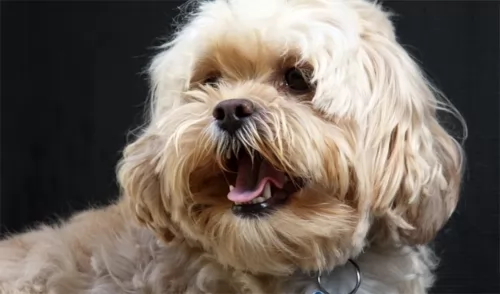 Such a cute, cuddly teddy bear of a dog is popular with everyone who just wants a wonderful canine companion.
Such a cute, cuddly teddy bear of a dog is popular with everyone who just wants a wonderful canine companion.
Both the Lhasa Apso and the Poodle are ancient dog breeds and they are the two breeds that have been used to bring about the Lhasapoo. The Poo has been bred to essentially be an indoor dog.
It would appear as though the Lhasapoo was developed in the United States of America, as in 1933, a pair was given to an American traveler who developed a kennel.
 The Schweizer Laufhund is a breed born in Switzerland and sought after by the French and the Italians for their skill at hunting small mammals, especially hare. Mercenaries brought scent hounds from France to Switzerland and cross bred them with the Schweizer Laufhund, thereby influencing and changing the native breed.
The Schweizer Laufhund is a breed born in Switzerland and sought after by the French and the Italians for their skill at hunting small mammals, especially hare. Mercenaries brought scent hounds from France to Switzerland and cross bred them with the Schweizer Laufhund, thereby influencing and changing the native breed.
In 1882 it was established that within the breed of “Swiss Hound” (Schweizer Laufhund) there were five different varieties. At this time a standard was written for each of these five different types. By 1909 the standards were revisited and revised, eliminating the hound of Thurgovie. Then in 1933 it was decided that one standard would cover all the varieties of the Schweizer Laufhund.
The Schweizer Laufhund was a line used to develop many different scent hounds. They are used almost exclusively as hunting dogs and not as family companion dogs. St. Hubert Jura Hound, the rare ancient variety, is still in the hunting parties of Canada and France. The breed existed before any dog breeding written records were kept. In Switzerland from the middle ages on, the Schweizer Laufhund was the only hunting dog in the country until recent times.
Even though they didn’t have any popularity until the European nobility became enamored of them in the middle ages, it is thought by some that they date back to the Roman Empire. In actuality most of their pre- Swiss history has been lost. We do know that through the years the breed has been influenced by cross breeding with Austrian, German and French scent hounds.
He is not recognized by the larger kennel clubs such as AKC or UKC, but by some rare breed associations. The dogs that remain today in the United States, Canada and Europe are still mainly owned by either active or retired hunters. Despite their great personalities, they are still not numerous among family pets.
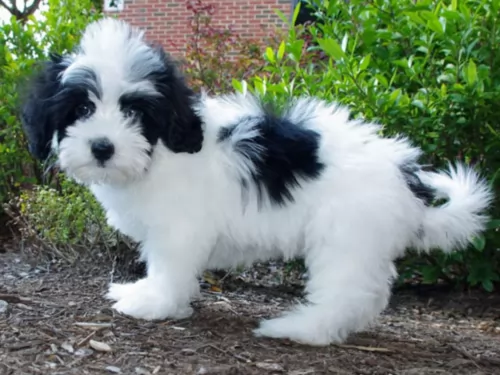 The Lhasapoo is a mix of Poodle and Lhasa Apso. He is a small dog standing between 25–28 cm in height and weighing 4 – 6kg.
The Lhasapoo is a mix of Poodle and Lhasa Apso. He is a small dog standing between 25–28 cm in height and weighing 4 – 6kg.
Known as a designer breed, his small size allows him to adapt to life in the city or to the countryside. He is such a cute little dog with his alert face, his bright brown eyes, short legs and floppy ears.
His coat is thick and dense and can be curly or fairly straight. It comes in a number of solid colors – apricot, tan, cream, brown, white and black or he can be bi-color – any of these colors mixed with white. In fact, as a crossbreed he can inherit the looks of either dogs – the Poodle or Lhasa Poo. Because he has poodle in him, these dogs are sometimes spoken about as being hypoallergenic.
Small and gentle in nature, the Lhasapoo makes a splendid pet and companion for everyone. He is such an amicable small dog, getting on well with both children and other pets in the home.
You can’t really tell what kind of a dog he’ll turn out to be in terms of his character, because he can be quite aloof if the Lhasa side of him is stronger or he could be playful and friendly if the Poodle side of him is stronger.
 A medium sized dog with good endurance and strength. Its head is lean, and its muzzle is long making this a very noble looking breed. Each of the 5 varieties has some of its own characteristics. They all have short, fine hairs on their ears and heads and longer hairs on their legs and back.
A medium sized dog with good endurance and strength. Its head is lean, and its muzzle is long making this a very noble looking breed. Each of the 5 varieties has some of its own characteristics. They all have short, fine hairs on their ears and heads and longer hairs on their legs and back.
• Bernese – White with a black saddle or black patches and tan on the ears and face.
• Lucernese – Because they have white and black hair mixed across their bodies, they appear to be “blue”.
The Schweizer Laufhund come in miniature and standard sizes fitting into the same standard. Weight has a lot to do with the gender and height of the individual dog, they are longer than they are tall. As a scent hound, the breed is muscular and sturdy. They carry their long tails in a slight curve with a taper at the end.
Despite the different colors in the different varieties all of the breed have black noses, long droopy ears, and oval, brown eyes. They have a soft, calm and gentle facial expression.
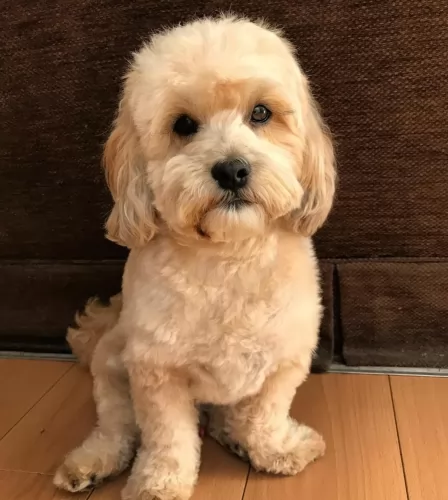 The Lhasapoo is a crossbreed, so you never know what you’re actually going to get – a little bit of Lhasa or a little bit of Poodle.
The Lhasapoo is a crossbreed, so you never know what you’re actually going to get – a little bit of Lhasa or a little bit of Poodle.
One thing is for sure though – you’re going to get the cutest little pet ever. He is a friendly, affectionate dog, but the Lhasa side of him makes him wary of strangers, making him an excellent watchdog.
They have a moderate activity levels and will adapt easily to life in the city or in the countryside, but they will need a walk every day to ensure he doesn’t become unfit and obese.
Lhasapoo puppies are adorable but every cute puppy grows into an adult. Then it’s time to show you’re a responsible dog owner by continuing to love and care for your adult Lhasapoo so that he becomes the wonderful companion he is designed to be.
 1Children friendliness - they can be very gentle and loving with children. Toddlers might remind them of prey, however.
1Children friendliness - they can be very gentle and loving with children. Toddlers might remind them of prey, however.
4.Learning ability -their learning ability is high, but they can be very stubborn.
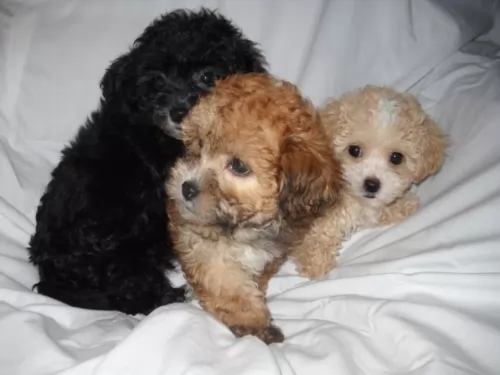 All dogs have the potential to become ill but when you give your dog the best chance to eat well and he is loved and cherished, he can live a long life.
All dogs have the potential to become ill but when you give your dog the best chance to eat well and he is loved and cherished, he can live a long life.
The Lhasapoo can live to be 15 years of age if you treat him well and ensure that he has a healthy diet. Of course as a crossbreed, his chances of developing inherited diseases is limited.
Watch out for Bloat, particularly if your pet gobbles up a large bowl of food. It is better to feed him 2 smaller meals a day. There are some time-releasing food bowls available for pets to encourage slower eating.
With Bloat, you’ll notice your pet’s stomach is swollen up. Complications set in when the stomach turns or twists as fluid and air can’t escape. Your dog will also be restless, drooling and trying to vomit. Bloat is a life-threatening illness.
This can be a complication from disease or medications even. It is important to keep your pet’s teeth healthy as chronic kidney disease can be caused by dental disease too. Bacteria from the diseased teeth and gums enters bloodstream and damages vital organs like the kidneys.
 There are a few health issues that the Schweizer Laufhund is prone to. As an ancient breed there is not a lot of genetic evidence of breed health issues but there is more recent reporting.
There are a few health issues that the Schweizer Laufhund is prone to. As an ancient breed there is not a lot of genetic evidence of breed health issues but there is more recent reporting.
• PRA (Progressive Retinal Atrophy) – hereditary – can result in blindness.
• Ectropion and Entropion – eyelid misalignments either inward or outward. Can be corrected with surgery.
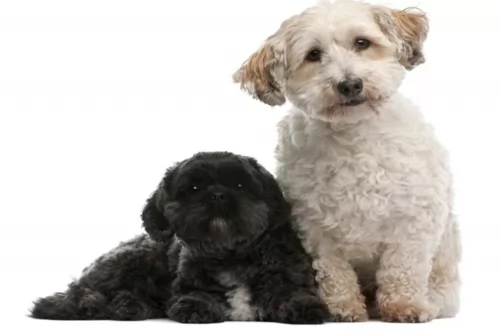 The Lhasapoo is a dog breed that likes to spend time indoors. Because of his looks, his human family members will no doubt be vying for his attention and playing indoor games with him. It will do him good to get out for a walk every day as this gives him the chance to sniff around and smell different things and experience life outside his home.
The Lhasapoo is a dog breed that likes to spend time indoors. Because of his looks, his human family members will no doubt be vying for his attention and playing indoor games with him. It will do him good to get out for a walk every day as this gives him the chance to sniff around and smell different things and experience life outside his home.
The Lhasapoo isn’t a big eater and he will require top quality food for small breeds. He isn’t a big meat eater so a tiny bit of cooked chicken, rice and vegetables chopped up nicely and added to his kibble from time to time will keep him healthy and happy.
Being the crossbreed that he is, you can’t be too sure about the type of coat your Lhasapoo will have. It can be curly, wavy or straight. Most inherit curls.
A Lhasapoo coat looks wonderful when it has been professionally groomed, and then in between grooming, his coat will need to be brushed to prevent tangling. While you’re brushing him, check his eyes too. Sometimes he can develop tear stains beneath the eyes and you can wipe gently around his eyes.
Other grooming for your cute little dog includes having his nails clipped as well as checking inside the ears for infection. Excess wax and dirt can result in an ear infection. You’ll notice your pet shaking his head, the insides of his ears might be red and he wants to scratch his ears. Get him to the vet who will show you how to keep his ears clean and dry.
Also, brush his teeth with special canine toothbrush and toothpaste. Dental disease won’t only damage his teeth, it can cause problems with other parts of the body too.
 . Feeding the puppy – as an active working breed they should be fed a high quality active or working breed kibble formula.
. Feeding the puppy – as an active working breed they should be fed a high quality active or working breed kibble formula.
2.Feeding the adult - the adult should be fed the same active or working breed formula, only in an adult formulation.
4. Games and Exercises – this active breed does require a lot of daily exercise. Take them on at least one good, quick walk per day and give them a fenced yard to play in. They love hunting training and field trials along with activities like barn hunt. They love to run alongside as you bike or jog.